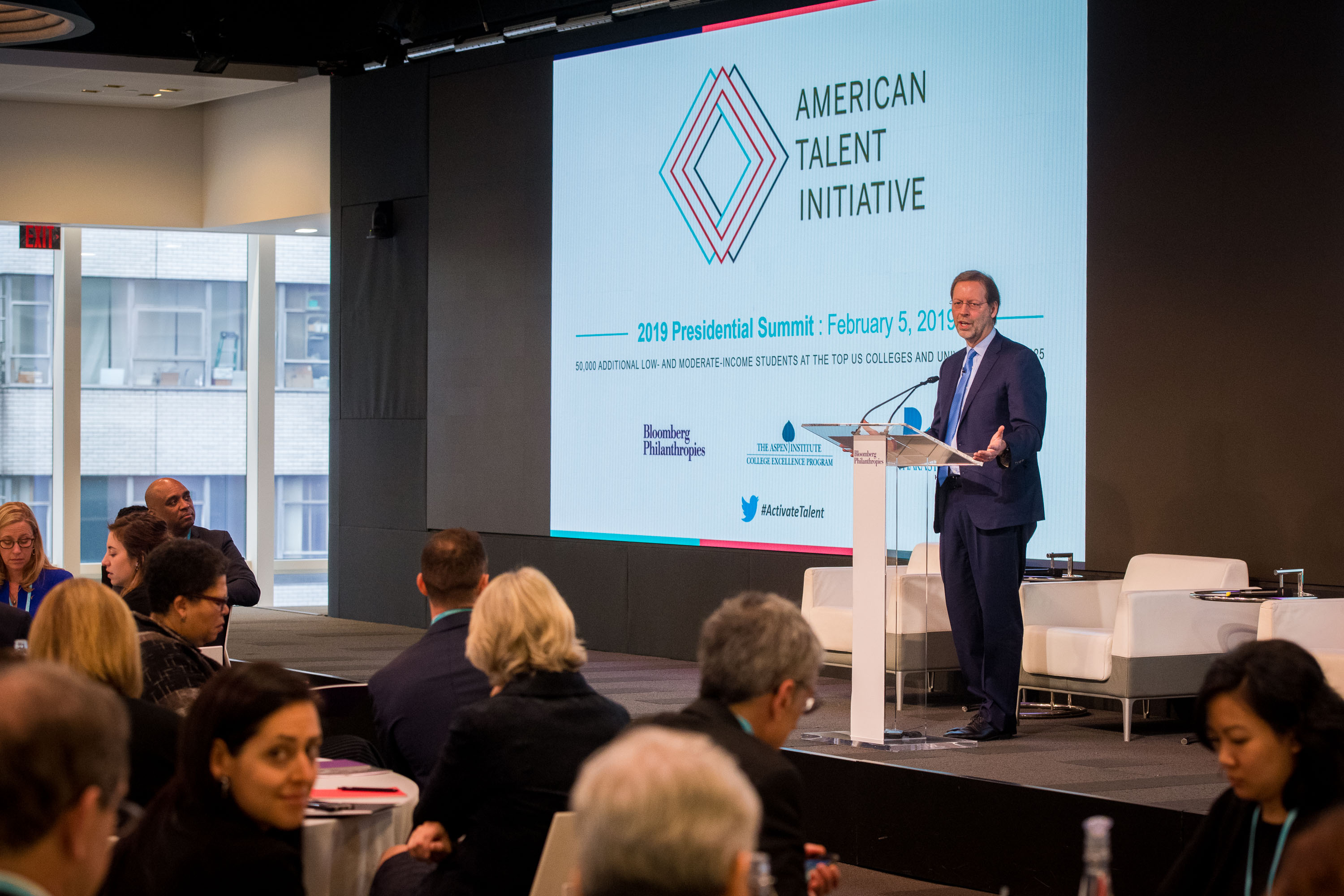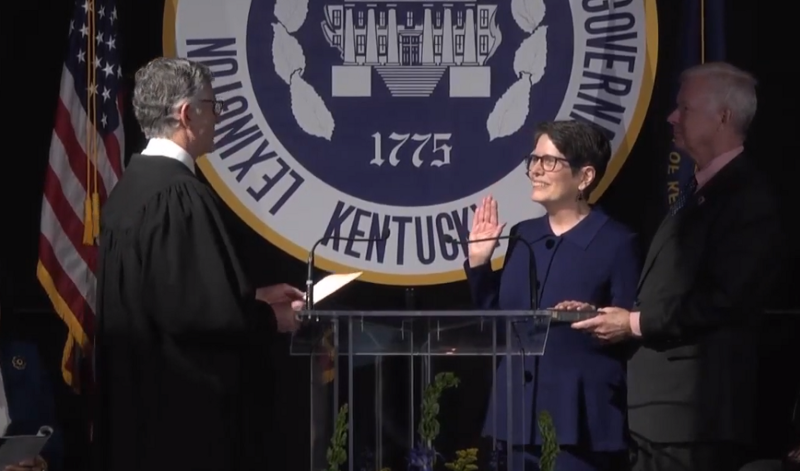
Follow the Data Podcast: American Talent Initiative, A Progress Report
February 5, 2019
As members of the American Talent Initiative (ATI) convene this week, we are re-running an episode featuring a conversation between Dan Porterfield, ATI Steering Committee member, and Howard Wolfson, head of the education program here at Bloomberg Philanthropies. At the time this episode was recorded, Dan Porterfield was the president of Franklin & Marshall College; he is now the president and CEO of the Aspen Institute.
Read moreNew report: What American cities learned from last year’s Mayors Challenge
January 30, 2019
By James Anderson, head of the Government Innovation program at Bloomberg Philanthropies
American cities are in a unique and powerful position to uncover innovative, scalable, and impactful solutions to today’s biggest concerns—including everything from homelessness and opioid addiction to climate change and mobility. And that’s why, after successful runs in the United States, Europe, and Latin America & the Caribbean, Bloomberg Philanthropies’ Mayors Challenge returned to the U.S. last year: to empower the kind of optimistic and entrepreneurial problem-solving city leaders are ready to deliver.
Read more
Follow the Data Podcast: Insights from the Digital Republic: A Conversation with the President of Estonia
January 22, 2019
Estonia is a leader in the field of digital government. In a conversation between Bloomberg Philanthropies Government Innovation lead James Anderson and President of the Republic of Estonia Kersti Kaljulaid, the president describes her country’s dedication to providing streamlined services, protecting citizen’s privacy, and taking proactive steps to get people the information they need.
Read more
Building city hall capacity to fight climate change: 6 takeaways from U.S. cities
January 16, 2019
This year, we’ve been able to get an inside look at an important question: How ready are American cities to fight climate change? The answer is important to the future of our planet. Globally, cities are the source of 70 percent of all greenhouse-gas emissions, particularly via the cars urban dwellers drive and the energy required to heat and cool their buildings. U.S. cities are responsible for a disproportionate share of the total.
Our inside look came through the Bloomberg Philanthropies American Cities Climate Challenge. It’s a $70 million effort aimed at accelerating work already happening on the ground in U.S. cities to reduce carbon pollution. More than 50 cities applied, and as co-leaders of the initiative, we visited almost 40 of them.
Read more
Advice for new mayors — from some of the best at the job
January 10, 2019
Hundreds of new mayors across the United States and around the world are settling into their new role as “city CEO.” It’s one of the toughest jobs in public service, and — as most people who hold the job will quickly point out — one of the most rewarding. That’s because mayors are uniquely situated to not only know many of their constituents by name, but also, by providing better services, to directly impact their lives.
Read more
Follow the Data Podcast – 2018 Highlights
December 28, 2018
The Follow the Data podcast features conversations with Bloomberg Philanthropies program leads and our partners – experts in the field, doing the work to ensure better, longer lives for the greatest number of people. Each episode features a data point, illustrating the work of partners across Bloomberg Philanthropies five program areas: the arts, education, the environment, government innovation, and public health.
Read more
Fulfilling America’s Pledge – Climate Mayors, 20 Leading Cities, and New Partnerships Lead America’s Electric Transportation Future
December 20, 2018
This past month the United States sold its one-millionth electric car (more than 4 million have been sold globally). The event marks a significant milestone and demonstrates that mobility in the U.S. is on the threshold of a major technological transition to an electric mobility future. This monumental transportation transition is coupled with unprecedented levels of subnational engagement on climate change. Leadership on climate change and clean transportation is increasingly coming from states and cities who have come forward to uphold the Paris Climate Accord in the face of federal resistance.
Read more
Follow the Data Podcast: Vehicle Safety – Improving Standards for All Consumers
December 17, 2018
Many low- and middle-income countries have little or no regulatory standards for vehicles.
For example, in the United States all cars must have seat-belts and airbags, which together reduce the risk of death by 61%. But in many countries where we work, car manufacturers are not required to install seat-belts or airbags, leaving the passengers at higher risk for death and injury.
That’s why the Bloomberg Philanthropies Initiative for Global Road Safety has dedicated $259 million over 12 years to implement interventions that have been proven to reduce road traffic fatalities and injuries in low- and middle-income countries.
Read more
Fulfilling America’s Pledge – How Cities are Taking Charge in the Next Wave of Clean Energy Procurement
December 6, 2018
By Alexandra Rotatori, Rocky Mountain Institute and Celina Bonugli, World Resources Institute
Cities in the United States are uniquely positioned to spur growth in demand for renewable energy procurement, accelerate the transition to a clean energy system, and provide visible and practical examples for the country as whole. By demonstrating to states, regions, and the federal government that it is possible to take practical, actionable steps to decarbonize electricity use, city leaders have the potential to inspire impact far beyond their limited jurisdictions. (Case in point: the Washington, D.C., City Council just unanimously voted “yes” to require 100 percent of the district’s electricity to come from renewable sources by 2032—against a background of political gridlock at the federal level.)
Read more
Fulfilling America’s Pledge on Climate Change Means Turning Data-Driven Research into Real World Action
December 3, 2018
By Carla Frisch, Principal at Rocky Mountain Institute
In the United States, as in every country around the world, opportunities for climate leadership exist at every level of governance. So despite what the headlines may say about current inaction on climate change at the federal level, businesses, cities, and states are laying the groundwork for America’s low carbon future. The thousands of day-to-day investment decisions made by businesses, local solutions implemented by mayors and city councils, and win-win energy and environmental policies set by state governors and legislatures are adding up.
Launched in July 2017 in response to President Trump’s announced intent to withdraw from the Paris Agreement on climate, the America’s Pledge initiative has developed a comprehensive model for transformation across all major sources of greenhouse gas emissions in the United States, including electricity, buildings, transportation, industrial gases, and natural lands.
Read more